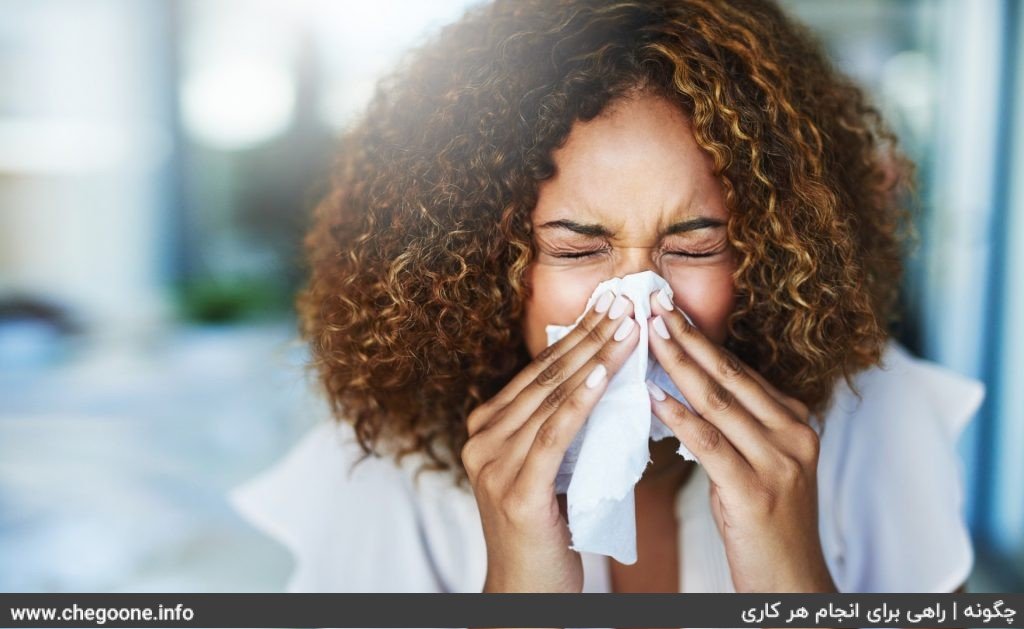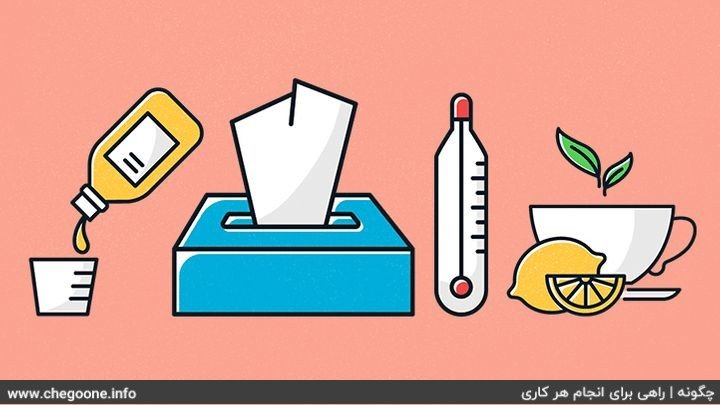How to prevent a runny nose (preventing a runny nose)
With the start of the cold season and the problems surrounding it, runny nose becomes a serious problem for people. Although some people struggle with these problems throughout the year. A runny nose is a very serious problem that can be very annoying at times. One of the most important reasons for this disease is seasonal sensitivity. Although there may be many reasons.
A runny nose is usually referred to as mucus coming out of the nose. This can be caused by the temperature outside, cold, flu or allergies. The treatment of this problem usually includes drinking a lot of fluids, especially water, and resting as much as possible. You can ease symptoms with a saline nasal spray and keep a humidifier near your bed to combat congestion exacerbated by dry, cold air.
Why does a runny nose happen? What causes a runny nose?
A runny nose may have one or more causes. Possible causes include:
- allergy
- Cold temperatures
- a cold
- Flu
- Taste rhinitis (which is also called non-allergic sensitivity and is caused by eating very spicy foods.).
How to prevent a runny nose

If you have a runny nose, you are most likely suffering from rhinitis. Rhinitis is an inflammation of the nasal passages that is often accompanied by congestion, nasal discharge, sneezing, irritated throat, cough and fatigue. If your runny nose is due to allergic rhinitis, it is better to take antihistamines.How to deal with seasonal allergies). But if your runny nose is caused by non-allergic rhinitis, such as a virus such as a cold or flu, there are many ways to help you find relief.
1- Home remedies
Often, home remedies can clear up a runny nose. Things like steam and heat can help clear the nasal passages and drain them. These things can ease the pressure and help you feel better faster.
A runny nose usually resolves within a week to 10 days. However, if left untreated, it can lead to complications. For example, sinus infections can occur when fluid repeatedly builds up in the sinuses. Untreated allergies, colds, and sinus infections can increase the risk of ear infections.
2- Hot drinks

Warm drinks are soothing when you have a runny nose and can be effective in treating a sore throat. This is especially helpful if the illness causes your nose to run. It is also very useful in case of runny nose after illness. Fluids help the immune system function by making it easier for nutrients to reach the body’s cells and by thinning mucus. Choose warm drinks that are nutritious and naturally hydrating, such as chicken broth, herbal tea, and warm water with honey and lemon.
3- Eat your face
When you have a stuffy throat or nose, bending over a bowl or pot of hot water may loosen the nasal mucus and help it drain more effectively. To use this method, pour boiled water in a bowl or pot. Next, pull a towel over your head and bend over the bowl until your face is about half a meter above the water. Make sure the bowl of water is on a stable surface to avoid spills and burns. Avoid scalding by steam by keeping a sufficient distance from the water.
Due to the risk of burns, they have prohibited the use of facial incense for children. Never put hot water on your feet. Instead, place it on a sturdy surface away from pets and children.
4- Hot water shower
A hot shower works like inhaling steam. However, you are using steam from a hot shower instead of a bowl of hot water. You can take a shower or sit on the floor and breathe in the steam without taking a shower. A steam bath is safer for children than other methods of inhaling steam and can reduce hot water spills. However, still supervise children in the bathroom.
5- Rest
A runny nose is a good sign because it indicates that your body is fighting disease and of course infection. Rest is the most important factor to improve and strengthen the immune system. It means that you must rest when you are sick. So take a runny nose as a sign and rest a little more. Try to take a nap even during the day.
6- Warm compress
A warm compress on the face can help loosen the mucus, so it will be able to drain more effectively. You can make a warm compress by taking a towel under warm water and placing it over your nose and eyes for 10 to 15 minutes.
7- Smoking device
A humidifier adds moisture to the air. Like other moisture-related treatments, a nebulizer helps loosen mucus so your nose can clear secretions more effectively. Using the vaporizer is convenient and hassle-free because you can turn it on while sleeping in the bedroom. Keep the humidifier clean so you don’t accidentally introduce mold and other pathogens into the air.
8- Netipot device
A neti pot is a device that is used to help clean the nasal passages by washing mucus and washing the sinuses. Only distilled, sterile or boiled and cooled water is recommended when using. Tap water can contain organisms that can cause infections when it gets into your nose.
To use the NetiPot device, follow the steps below:
- At first, be sure to bend over a sink and tilt your head.
- Breathe in through your mouth and insert the mouthpiece of the neti pot device into the nostril above the nostril (the liquid exits through the other nostril and goes into the sink).
- Repeat the same action on the other side.
- Clear the nostrils by blowing into the nose.
The neti pot needs a saline solution instead of plain water so that the water passes through the delicate tissues of the nose. Ask a pharmacist to help you find a salt intended for this use.
9- Medicines
There are many medications that can be used to help stop a runny nose. Each of these drugs should be used according to the source of the runny nose. For example, if you suffer from allergies, you should use special medicines and these medicines are not suitable for other reasons of discharge. Before using the medicine, you must first find the source of the problem.
10- Nasal spray
There are different types of nasal sprays that may help relieve a runny nose. You should choose its type based on your reason and preference. Choosing a spray sometimes requires experimentation. The choices are:
- Nasal spray (a solution consisting of water and salt that is usually used to wash the nasal passages)
- Topical nasal steroids, such as Nasonex (methasone) and Flonase (fluticasone propionate)
- Topical nasal antihistamines, including Astelin and Aspero (Azalastine) and Patanase (Alopatadine)
- Topical nasal anticholinergics, such as Atrovent nasal (nasal ipratropium)
- Topical nasal stabilizers, such as NasalCrom (cromolyn)
Many over-the-counter (OTC) nasal sprays are available. However, anticholinergics are only available by prescription. In addition, some OTC varieties are also available in higher strengths by prescription only.
11- Prescription drugs
Prescription medications that may help with your runny nose include:
- Decongestants, such as Sudafed (pseudoephedrine) to relieve congestion
- Antihistamines such as Benadryl (diphenhydramine), Claritin (loratadine), and Zyrtec (cetirizine) block the production of histamine to relieve allergies.
- Pain relievers, such as Tylenol (acetaminophen), and nonsteroidal anti-inflammatory drugs (NSAIDs), such as Advil (ibuprofen) or aspirin, do not directly help with a runny nose. However, they can help if you also have other pain symptoms, such as a headache or fever.
When should you see a doctor?
Runny nose usually resolves on its own. However, a runny nose can sometimes turn into something more serious, such as an infection. If you experience the following symptoms, be sure to see a doctor:
- facial swelling
- blurred vision
- Sore throat worsens instead of getting better
- White spots on the throat
- Nasal discharge that has a bad smell or is very cloudy
- Symptoms that persist for more than 10 days
- Discharge from a sudden event such as a blow to the head
What is a runny nose?

A runny nose can happen to anyone and we don’t even know why. This can be caused by the temperature outside, cold, flu or allergies. Rhinorrhea, a term often used interchangeably with the term “runny nose,” refers to the thin, mostly clear discharge you may experience from your nose throughout the day. Another term you may hear about this problem is rhinitis. Rhinitis is inflammation of the nasal tissues.
When a cold virus or an allergen such as pollen or dust first enters your body, it irritates the lining of your nose and sinuses (or the air-filled pockets around your nose) and your nose begins to produce clear mucus. This mucus traps bacteria, viruses or allergens and helps to flush them out of the nose and sinuses. After two or three days, the mucus may become discolored, white, or yellow. As the period of runny nose becomes longer, it may cause concern for some people. However, such cases are rarely a sign of a serious issue and will usually resolve after a few days.
How does the nose work to protect the body?
The process of breathing starts from the nose. Air enters the lungs through the nose. This action helps to filter, humidify, warm or cool the air that comes in through it so that the air that reaches the lungs is clean. A special layer of mucus or a moist tissue covers the inside of the nose and is made up of mucus-producing glands. When bacteria, allergens, dust or other harmful particles enter the nose, the mucus traps them. Nasal mucus is actually very useful for the health of the body and in some way plays the role of preventing infection from entering the body.
The mucosal lining also contains cilia and tiny hair-like structures. The cilia are constantly moving, picking up harmful particles and moving the trapped mucus through the nose to the back of the throat. Then it is swallowed by the acid in the stomach and destroyed. If the presence of mucus in the nose causes problems for you, it can be easily removed by coughing. When the temperature outside is cold, this process slows down. Many times, mucus remains in our nose and then causes a runny nose.
last word
Many things can cause a runny nose, including allergies, viruses, and cold weather. Often, a runny nose does not need treatment. However, it may be relieved by some home remedies such as steam, warm compresses, and warm drinks. Nasal sprays and prescription medications can also help. If you have a runny nose often, you may need to seek medical treatment because chronic rhinitis can make life difficult and lead to infections. You may even have an allergy that will be controlled with proper diagnosis.


